May 13, 2014
Alexis Parnell
Tish Pegues
Erynn Showers
May 14, 2013
Tammy Miller
Jeremy Shelley
Ramona Zullo
May 08, 2012
Barbara Azzam
Kathy Gilder
Mike Worley
October 11, 2011
Cheryl Gorringe
Cristina Boudah
Jayne Sales
May 17, 2011
September 29, 2010
Teresa Arce
Maria Jimmison
Terry Lewis
May 14, 2010
Ken Kavanaugh
Sydney Newton
Teresa Smith
September 25, 2009
Amy Scoggins
Annalie Maynard
Linda Green
May 14, 2009
September 30, 2008
Doris Riccelli
Hunter Aiton
Vicki Sauer
April 29, 2008
Glynnis Cory
Nancy Hampton
Chris Russell
October 17, 2007
Meg Ingram
Rhondalyn Acklin
Rick Johnson
May 14, 2007
Laurie Harris
Frank Langelaan
Julie Nunn
October 02, 2006
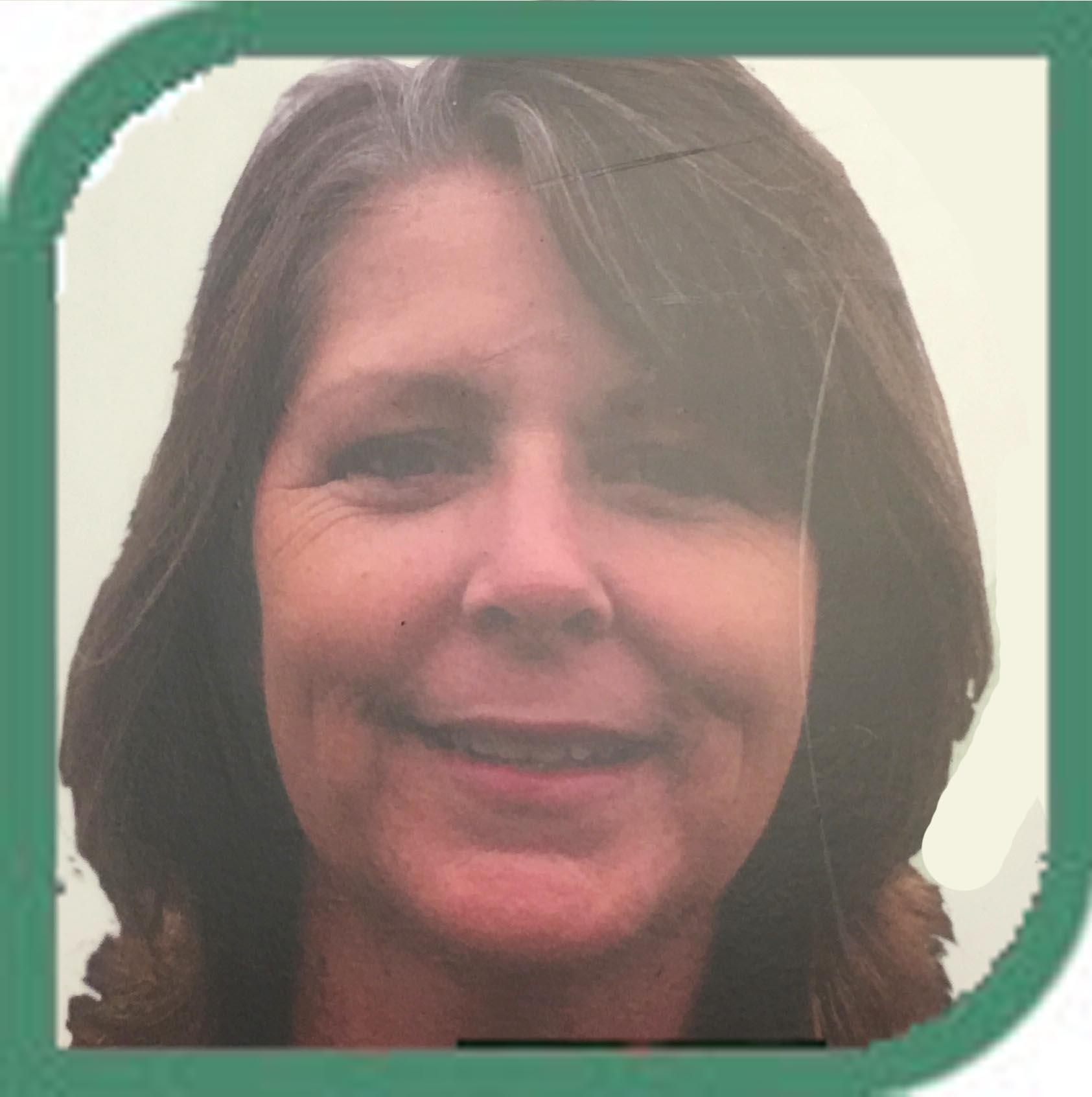 Erynn Shower’s family includes a wonderful husband named David, and two sweet children, Brandon and Kaisey. We were rolling along with a normal happy life until cancer came along and changed everything. The diagnosis of stage three-colon cancer came in October 2012, and then can surgery to remove a large tumor and six months of chemotherapy. Three months later, the tests showed that the colon cancer had spread into my lungs. Therefore, I now have stage four-colon cancer and will have chemotherapy for an indefinite time. The fight of my life has begun!
Erynn Shower’s family includes a wonderful husband named David, and two sweet children, Brandon and Kaisey. We were rolling along with a normal happy life until cancer came along and changed everything. The diagnosis of stage three-colon cancer came in October 2012, and then can surgery to remove a large tumor and six months of chemotherapy. Three months later, the tests showed that the colon cancer had spread into my lungs. Therefore, I now have stage four-colon cancer and will have chemotherapy for an indefinite time. The fight of my life has begun!
Usually I am a very happy, upbeat person. Overwhelming only begins to describe all the love I have received. God has blessed me with a wonderful family and a multitude of friends. My church family had a healing service for me. My friends bring food, send cards, and call me. The love and prayers that come, touch my heart each day. I have chemotherapy every other week and have crossed paths with man very special, caring people at the cancer institute here in Huntsville.
For the garden, I have chosen a ribbon of dark blue flowers to symbolize my fight against colon cancer, as well as hot pink flowers that are my favorite color and bring me happiness. In addition, there is a border of sage to symbolize long life. I am on a journey that I did not choose to be on and one I do not want to take. However, with Jesus at my side, I can do anything, and I can hope for my miracle future. I also encourage everyone to have all the available test for cancer.
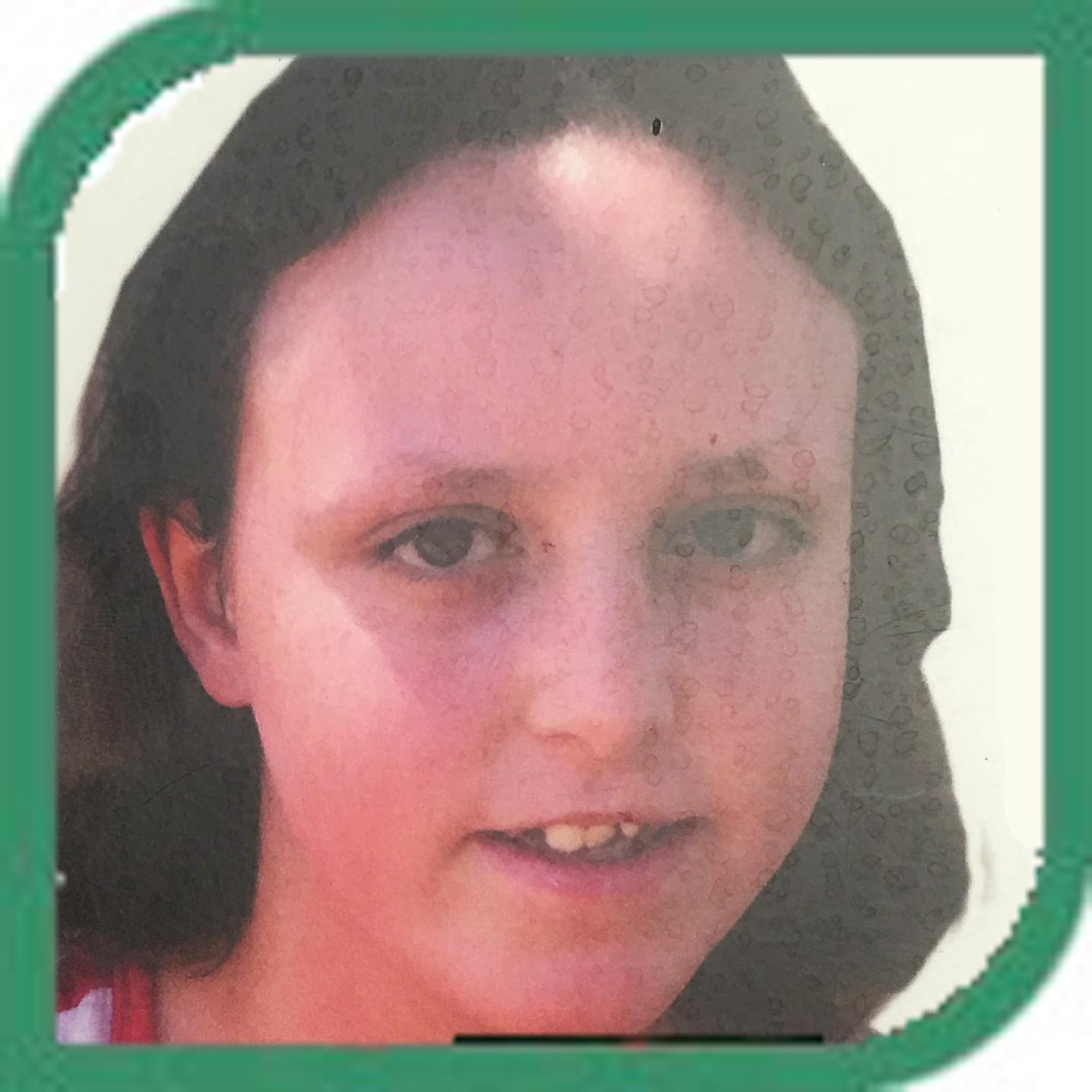 Alexis “Lexi” Parnell enjoys baking, basketball and spending time with her family. With two younger brothers, an older sister and her mom surrounding and supporting her, Lexi is taking her diagnosis in stride. Her friends are a great support and diversion as well.
Alexis “Lexi” Parnell enjoys baking, basketball and spending time with her family. With two younger brothers, an older sister and her mom surrounding and supporting her, Lexi is taking her diagnosis in stride. Her friends are a great support and diversion as well.
Lexi was 14 when she was diagnosed with Chronic Myelogenenous Leukemia (CML). Routine blood work for migraines, taken on Wednesday, August 21, 2013, at Huntsville Hospital for Women and Children, complications that night, she was set to ST Jude’s Children’s Research Hospital in Memphis Tennessee. Lexi stayed in Memphis at St Jude’s for two weeks, where she received her chemotherapy under the watchful eyes of the wonderful doctors, nurses, and staff.
She came back home to Huntsville Hospital on September 4, 2013. Here she is continuing her chemotherapy at the St. Jude’s affiliate at Huntsville Hospital. Lexi and her family were already familiar with St. Jude’s Children’s Hospital facility in Huntsville due to her brother’s struggles with Cerebral Palsy.
Lexi’s mom shares that “At this point Alexis is doing absolutely wonderful thanks to St Jude’s. As of December 23, 2013 (after only 4 short months of treatments), Alexis is in remission. She will still continue chemotherapy as her type of leukemia requires life-long treatment” or until a cure is found for CML.
Lexi’s design will contain her favorite color purple represented as indigo and violet. She chose to create a rainbow display that is a reflection of her colorful spirit! The seven colors of the rainbow are symbolized with red for vitality, orange for creative energy, yellow for wisdom, green for life, balance and nature, blue for spirituality, indigo for infinity and violet represents the highest element of spiritual mastery. Flowers and foliage transform this garden creating an inviting experience for everyone to see.
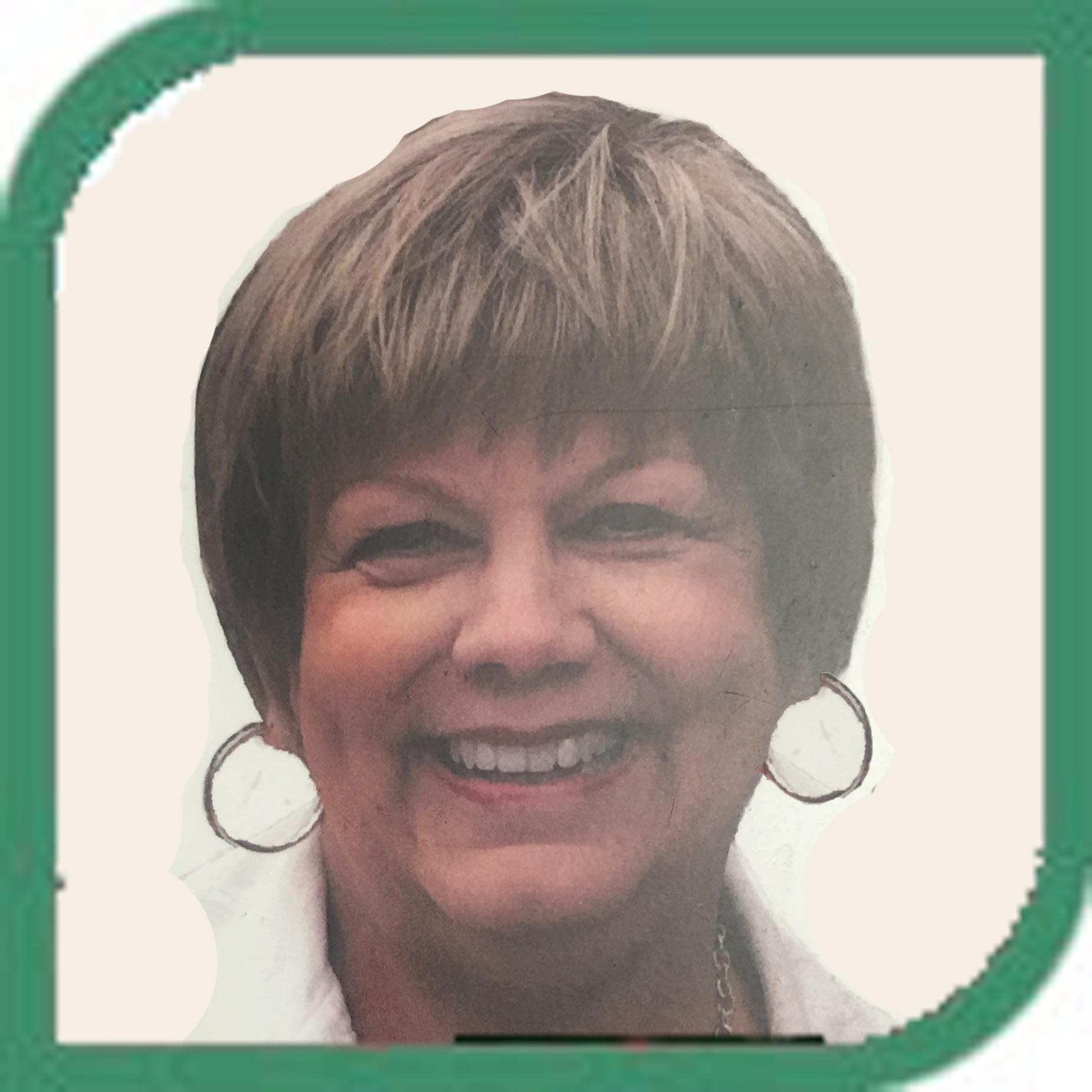 Tish Pegues leads an active life with many hobbies, including tennis, running, singing, and is an avid reader. She has also been a career person her entire life, most recently with anew consulting business, Full Bloom, last July, to advise non profit organizations with fundraising, marketing and event planning. She took time out of her buy schedule to go to her routine annual mammogram appointment in September. Little did she know that her life would soon be changed forever.
Tish Pegues leads an active life with many hobbies, including tennis, running, singing, and is an avid reader. She has also been a career person her entire life, most recently with anew consulting business, Full Bloom, last July, to advise non profit organizations with fundraising, marketing and event planning. She took time out of her buy schedule to go to her routine annual mammogram appointment in September. Little did she know that her life would soon be changed forever.
A Her2Positive cancer was found and she was diagnosed on September 27th. Within a two-week period, she had met with an oncologist, a surgeon, and a radiologist. A rigorous chemotherapy regimen began October 14th. Although the chemo has been very effective, her aggressive type of cancer has re required several surgeries, including two lumpectomies, removal of lymph nodes, a mastectomy, seven weeks of radiation, and a full year of Herceptin infusions as part of her treatment plan.
Tish chooses humor to get her through the tough time in life. When announcing her mastectomy plans to her Facebook network, she said “I just need to get a couple things off my chest”. She has tormented her younger son, Connor, with threats that “you have to be nice to me all the time, because who’s mean to their mom with cancer?!” This humor, along with her positive outlook on life, has served her well. She considers the positives in every situation, as evidenced by one of her favorite quotes: “Life isn’t about waiting for the storm to pass. It’s about learning to dance in the rain” Her faith is also a very big part of who she is and how she copes with cancer battle. her Cove Methodist church family has been there for her every step of the journey.
Tish has wonderful support of friends and family. Her husband, Leigh, has been a rock, and has had a knack for always knowing the right things to say and do for her. His nickname for her lately has been “Peach”, because of her peach fuzz hairdo.
She says that although pink used to be her favorite color, she’s seen enough of it with breast cancer, and now prefers orange. ” It’s a fierce color and a fierce attitude is what you need to be to get you through this” she says. Her garden is planted in shades of orange, lime green, and white- all vibrant colors that reflect her vivacious personality.
Breast cancer will not control Tish and she is fighting back. Her story, shared extensively through her Facebook posts, has reached many and has served to remind everyone she knows how important early detection and regular exams can be. As she has said many times, “This cancer chose the wrong girl to pick on!”
 Tammy Miller was blessed with a beautiful voice that she shares with others at Asbury United Methodist Church. But she doesn’t just leave her voice at the sanctuary door. Tammy is also an advocate for those in her community who need a voice as well – young women in difficult situations. “There are lots of people out there who are worse off than me,” she stated. And it’s this attitude that exemplifies Tammy’s humble approach to life.
Tammy Miller was blessed with a beautiful voice that she shares with others at Asbury United Methodist Church. But she doesn’t just leave her voice at the sanctuary door. Tammy is also an advocate for those in her community who need a voice as well – young women in difficult situations. “There are lots of people out there who are worse off than me,” she stated. And it’s this attitude that exemplifies Tammy’s humble approach to life.
In August 2011, Tammy awoke to feel a lump in her pelvis area. Concerned, she went to the doctor for an ultrasound. Although the doctors thought it was a benign tumor, it grew rapidly – reaching nearly six pounds in weight. After undergoing surgery to remove the tumor, Tammy traveled to New York to see a specialist. She learned she had Leiomyosarcoma, a rare uterine cancer that affects one in four million people.
In a seven-month timeframe, Tammy had more than 40 tumors in her abdomen removed and underwent several rounds of chemotherapy and radiation treatments. She is currently undergoing chemotherapy to battle the return of her tumors. Despite the struggle of shielding the effects of her disease from her children, she finds solace knowing her family: husband, Bobby; his children, Audrey and Morgan; and her children, Layne and Preston, continue to offer their loving support.
Although the disease weakens her physically, Tammy finds inner peace through her faith in God. “When you’re first diagnosed, there’s such fear and panic about the things you don’t know. But then you come to this place where it’s up to your faith to see you through,” Tammy explains. “The doctors are fantastic, but ultimately, it’s up to God and my faith in Him. He meets us where we are.”
Tammy’s garden, consisting of a vibrant bed of color, is meant to draw visitors from a distance. “Bright, beautiful flowers bring me great joy, and I wanted to share that with someone else,” Tammy says. She also incorporated vinca into her garden after learning this plant had a hand in creating her chemotherapy medication.
When asked what Tammy wanted to share with others on a similar journey, she stated: “Even though cancer tries to dominate your life, you have to decide not to let it be all-encompassing. You still have a life with so much you can enjoy and be thankful for. No matter what life throws at you, you can still have joy and laughter.”
 Jeremy Shelley is a firm believer that humor is the best medicine. With his upbeat attitude and ability to find the positive in whatever life throws his way, nothing seems able to keep him down…not even cancer.
Jeremy Shelley is a firm believer that humor is the best medicine. With his upbeat attitude and ability to find the positive in whatever life throws his way, nothing seems able to keep him down…not even cancer.
In 2003, shortly after Jeremy’s 30th birthday, his endocrinologist felt a lump in his throat. Although he thought it was minor because of thyroid issues in the past, Jeremy soon learned he had thyroid cancer. “It felt like a kick to the stomach,” he said. “In my mind, cancer was something that happened later. Not at age 30.”
In April 2003, doctors removed Jeremy’s thyroid. Shortly after, he began an oral radiation treatment to kill the lingering cancer cells. During his three-day treatment, Jeremy had to be totally isolated in a saran-wrapped hospital room. One of the toughest side effects of his medication was a shortened attention span. “To worsen things, I couldn’t even make it through one daytime television show,” Jeremy quipped. “I was constantly reminded how awful they all were each time I changed the channel.”
After his stint in the hospital, Jeremyrsquo;s thyroid sample was sent to Mayo Clinic. When the results came back inconclusive, his sample was sent to one of the foremost thyroid doctors in the world. It was only then Jeremy learned what he truly had – a rare cancer with only six documented cases in history. Jeremy joked, “I always knew I was unusual. Now I have medical proof to back it up.”
Now cancer-free for ten years, Jeremy was able to overcome his disease through his faith in God, the support of his family – wife, Alicia, and son, Liam – and his unyielding sense of humor. “If you can make someone laugh about your cancer story, it has no power over you,” he affirmed.
For his garden, Jeremy selected a cross centerpiece consisting of white SunPatiens – symbolizing faith and church family. Neighboring this is a field of blue petunias and red salvia, followed by rosemary and a small section of herbs for Jeremy to use incorrectly while cooking.
Jeremy wanted his garden visitors to remember these words of encouragement: “People have told me I don’t strike them as a cancer survivor. I take that as a compliment. Some people expect the worst when they’re diagnosed, but if you look for grace and peace in God, you can find it everywhere. You’re not alone in this.”
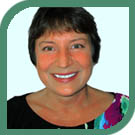 Ramona Zullo, a native of Germany, is what some would deem a powerhouse. She walks three to four miles several days a week, swims regularly, bikes on weekends, and participates in several sprint triathlons and 5ks and 10ks. Keeping strong in mind and body, she lives each day to the fullest. And by the way, Ramona is currently in remission of colon cancer.
Ramona Zullo, a native of Germany, is what some would deem a powerhouse. She walks three to four miles several days a week, swims regularly, bikes on weekends, and participates in several sprint triathlons and 5ks and 10ks. Keeping strong in mind and body, she lives each day to the fullest. And by the way, Ramona is currently in remission of colon cancer.
In February 2012, four months after her 50th birthday, Ramona had a routine colonoscopy. With no symptoms or history of cancer in her family, she was shocked to learn she had stage III colon cancer. After undergoing an operation to remove part of her colon, she began chemotherapy treatment. But this didn’t slow Ramona down. Two days after her fourth round of chemo, she participated in the Running through the Roses 5k race, earning her the Adult Racer of the Year award. “I never thought of myself as a victim,” Ramona stated. “Everybody can get cancer – I’m living proof of it.”
Ramona’s diagnosis was especially tough on her husband Joe and son Sean, who supported her every step of the way. Her friendship with Julie Willis, who was unsuccessfully treated for breast cancer, provided an intimate outlet for Ramona to openly share her deepest fears and concerns. “You learn a lot about yourself and others while battling cancer,” she said. “And the best that comes from it is the love and support from your family and friends.”
To raise awareness for colon cancer, Ramona’s garden includes a large blue ribbon framed with white alyssum, which symbolizes hope and strength. The ribbon is accompanied by a vibrant green sweet potato vine – a favorite of Ramona’s because of its easy maintenance and almost indestructible nature to withstand Huntsville’s summer heat. “This reminds me of the strength it takes to fight cancer,” she explained. In honor of her friend Julie and others touched by breast cancer, Ramona’s flowerbed is framed by pink pentas and nemesias. She also incorporated hydrangeas, which change from blue to pink depending on soil conditions, to resemble the colors of colon and breast cancer.
Ramona’s strength in life reverberates in her message to others: “Do not give up. Cancer is not the end – it is the end of a part of your life and then you start something new. Everything in life has a purpose and if my experience encourages others to get a colonoscopy, then some good came out of it.”
 After a routine mammogram, Barbara Azzam was asked to return to her doctor’s office for a biopsy. While awaiting her results from the biopsy, Barbara also had her annual pap smear. On May 26, 2011, Barbara’s doctor delivered unexpected news – she had breast cancer. While dealing with this life–changing realization, her results returned from her other biopsy. Two weeks after her first cancer diagnosis, Barbara also learned she had endometrial cancer.
After a routine mammogram, Barbara Azzam was asked to return to her doctor’s office for a biopsy. While awaiting her results from the biopsy, Barbara also had her annual pap smear. On May 26, 2011, Barbara’s doctor delivered unexpected news – she had breast cancer. While dealing with this life–changing realization, her results returned from her other biopsy. Two weeks after her first cancer diagnosis, Barbara also learned she had endometrial cancer.
Barbara had difficulty finding a local cancer treatment center that could treat both her cancers at once. After making several calls, Barbara connected with the Cancer Treatment Centers of America (CTCA) in Chicago. After her initial consultation, doctors suggested Barbara undergo both surgeries simultaneously – a complete hysterectomy and total mastectomy on one side. She waited more than two months for her operation, but on August 4, Barbara finally had her life–saving procedure.
Throughout her journey, Barbara’s most difficult struggle was the change brought on by her dual diagnosis. Barbara owns her own business as a vocational counselor, and with the pre–operative consultations and follow-up meetings after her surgery in Chicago, coordination with her clients became demanding. “I wanted to think I could deal with my cancer and move on without it affecting me, but that didn’t happen,” shared Barbara. “I had less energy. I was stressed with juggling work and travel to Chicago. It’s not something you can easily digest and move forward with, but you can get through it.”
Barbara gathered strength from her Christian faith, family, friends, and fellow cancer patients. Their affirmation that God was in control gave her the power to continue her journey. Barbara also found solace in the memory of her mother, Helen Hudson, who passed away from breast cancer several years ago. As a breast cancer survivor, Barbara’s garden displays various shades of pink cosmos and petunias, a particular favorite of hers since she was a child. She also selected bright green coleus to represent her renewed life.
Barbara is now cancer free. She is the wife of Dick Azzam and the proud mother of two children – Katie and Ben. When asked what she wants her garden visitors to remember, she stated, “Be your own advocate and maintain control of your healthcare. Don’t skip those annual exams. Stay positive, and always keep your sense of humor. Above all, keep God on your daily contact list.”
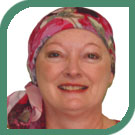 A planner by nature, Kathy Gilder schedules her mammogram each October – breast cancer awareness month. When her 2011 test returned questionable results, Kathy was scheduled for a biopsy. On Halloween, Kathy was diagnosed with two types of breast cancer.
A planner by nature, Kathy Gilder schedules her mammogram each October – breast cancer awareness month. When her 2011 test returned questionable results, Kathy was scheduled for a biopsy. On Halloween, Kathy was diagnosed with two types of breast cancer.
“My natural human response to my diagnosis was fear and a desire to run from that reality,” shared Kathy. But soon, Kathy began searching for acceptance of her condition. She asked her father-in-law, who was praying for a miraculous healing for Kathy’s body, to instead pray for peace and acceptance. “Because of these prayers and those of others, my spirit changed, and I began looking at this experience as a gift to embrace and perhaps bless others,” Kathy said.
In December, Kathy had a lumpectomy, followed by four rounds of chemotherapy beginning in January. There were numerous ups and downs with multiple side effects to deal with along the way. But, Kathy’s biggest challenge was giving up any sense of control. “I’ve always been very organized and used to feeling in control – but cancer takes that away. Having to let go was tough, but it has brought a whole new depth to my relationship with and reliance upon God.”
Kathy had tremendous support from her extended family, church, neighbors, and especially her Huntsville Botanical Garden family, where she serves as Vice President of Operations. Kathy was particularly encouraged by her husband Steve, who in loving support, shaved off his hair after Kathy lost hers during chemotherapy treatments.
Kathy’s garden represents life and all its idiosyncrasies. She selected a rainbow of colors to reflect God’s covenant of grace for better days to come. A multi-layered garden of different heights, smells, and textures imitate the many layers of cancer – for those afflicted and those touched. As someone who is typically systematic and organized, Kathy hopes her garden reflects the chaotic, “hot mess” the journey of cancer, as well as life itself, can be.
Kathy completed her four rounds of treatment in March and is currently undergoing radiation. Kathy’s message for other cancer survivors is, “The will of God will never take you where the grace of God will not protect you. Grasp the hand that He offers for strength, drink His Word for nourishment, and share your journey with those He places in your life – and you in turn will provide strength and inspiration for others. Choose to take the path of faith, hope, and love.”
 Mike Worley was lifting a computer out of his car when his back popped. He initially assumed it was a pulled muscle, but after months of constant pain, Mike had a CAT scan performed. On April 6, 2011, much to his surprise, he was diagnosed with multiple myeloma.
Mike Worley was lifting a computer out of his car when his back popped. He initially assumed it was a pulled muscle, but after months of constant pain, Mike had a CAT scan performed. On April 6, 2011, much to his surprise, he was diagnosed with multiple myeloma.
The Worley family – wife Pam, daughter Abbie, and son Michael – didn’t accept this diagnosis as debilitating, but rather focused on Mike’s first step to recovery – a kyphoplasty to treat his vertebral compression fracture. After healing from surgery, Mike began chemotherapy treatments. Despite the expected side effects, Mike was blessed with modest symptoms. After chemotherapy, Mike’s cancer cell count dropped from 60 percent to seven.
Throughout recovery, Mike was overwhelmed with support from friends at home and strangers abroad who read his story on CaringBridge about his struggles, triumphs, and his faith in God that saw him through it. “I have always been a self-reliant person,” explains Mike. “At first, I didn’t want anyone to feel burdened by my condition. I realized later that refusing their help would be robbing them of their blessing. Their assistance and support was as much a blessing for me as it was for them.”
In October 2011, Mike underwent a stem cell transplant. This procedure, although successful, destroyed his immune system. After the transplant, the Worley family spent 30 days in isolation to begin rebuilding his immunity. Eight days into the isolation, Mike had a fever and was admitted into the hospital. After stabilizing and completing his quarantine, Mike climbed in his tree stand in the woods and thanked God for his recovery. “We never had a day of doubt that everything was going to be okay,” stated Pam. “Our house was a house of joy. It was our positive attitude that got us through it.”
Mike’s garden reflects his outlook throughout his cancer journey – bright, vibrant, and full of life. A chartreuse sweet potato vine intertwines in a blanket of red salvia, and is peppered with basil, rosemary, and sage to reflect Mike and Pam’s love for cooking and entertaining.
Mike is currently cancer free and continues to impress his positive attitude on other cancer patients. “Joy is independent of your circumstances,” he says. “What we go through doesn’t have to be a bad thing. You can actually use it for good. Every negative thing in life is an opportunity.”
 In March 2010, Cheryl Gorringe’s chronic headaches didn’t seem to be cause for worry. Cheryl contributed these afternoon outbursts to stress, but by September, the afternoon headaches intensified and she began having random blackouts. Cheryl tried several methods to alleviate the pain, but none seemed to ease the pounding pressure.
In March 2010, Cheryl Gorringe’s chronic headaches didn’t seem to be cause for worry. Cheryl contributed these afternoon outbursts to stress, but by September, the afternoon headaches intensified and she began having random blackouts. Cheryl tried several methods to alleviate the pain, but none seemed to ease the pounding pressure.
On September 15, Cheryl’s mother visited her home in Melbourne, Australia, after her concerned son noticed Cheryl’s slurred speech during a phone conversation. While her mother was visiting, Cheryl had another blackout and was rushed to Royal Melbourne Hospital. The following day, the doctors delivered debilitating news. Cheryl had a four centimeter mass behind her right eye. The doctors immediately began surgery to remove the tumor, capturing all but a few cells attached to the lining of the brain wall.
Cheryl thought the operation was the end to her struggles, but throughout the next year, her cancer traveled from one area of her body to another. Doctors discovered a 4.3 centimeter carcinoma on her lung shortly after her brain surgery. While her month–long chemotherapy and radiation treatments reduced the tumor, doctors found another cancerous mass on her L5 vertebra. Cheryl has undergone several intensive treatments, and her spine is currently healing, but doctors recently found a spot on her hip that required more radiotherapy in July 2011.
Cheryl’s biggest struggle throughout her journey was learning to ask for help from others. “I’ve always been fiercely independent and private,” said Cheryl, “But with the steadfast support from my partner George, my family, and my friends, I was able to push through each adversity.”
Cheryl has been working as a receptionist at Intergraph Australia for seven years. “I would like to give a special thank you to Intergraph for their strong support and a thank you to my boss, Michael Greentree, who provided wonderful understanding and encouragement,” she stated. Cheryl’s cat, Bella, has also been her constant companion throughout her journey.
In homage to Cheryl’s home country, her garden incorporates native Australian plants. She selected her favorite flower, a blooming rose bush, and surrounded it with colorful pansies and spring tulips.
Cheryl hopes her experience will encourage others to talk about their illnesses. “Sharing your experience with others helps you know you’re not alone. Be positive and don’t dwell on the inevitable. Always look toward the future.”
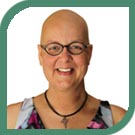 You wouldn’t know Cristina Boudah was sick by her bubbly personality. Perhaps her five children help her forget she’s supposed to slow down, but most who meet her account her positive demeanor to something more divine.
You wouldn’t know Cristina Boudah was sick by her bubbly personality. Perhaps her five children help her forget she’s supposed to slow down, but most who meet her account her positive demeanor to something more divine.
Cristina was nine months pregnant when she felt a lump on her right breast. She initially accounted the mass to blocked ducts, but 12 weeks after giving birth, Cristina had a biopsy performed to be sure. On July 2010, Cristina was diagnosed with stage IV breast cancer – the same disease her mother, Vivian Nelson, battled a decade earlier.
As knee–bucking as the word “terminal” sounded, Cristina faced her affliction like a warrior. She remembered reading 1 Thessalonians 5:16-18 in her Bible, “Rejoice always, pray without ceasing, and in everything give thanks, for this is the will of God.” When most would ask for alleviation of disease, Cristina asked her church family at Twickenham Church of Christ to give thanks for her cancer. Cristina’s faith in God’s purpose became stronger than her cancer.
Cristina admits her hardest struggle is missing out on her children’s daily lives. “The younger ones want to know why mommy can’t do what she used to do, like go to soccer games or school plays,” she lamented. “That part is hard because to them, I’m still Mom.” Despite Cristina’s limitations, she hasn’t been absent of help. Immediately following her diagnosis, Cristina’s church family scheduled five months of at-home meal delivery, community members arrived to help clean her home, and strangers from out of state sent her words of encouragement in the mail.
Cristina’s vibrant zest for life remains unabated by cancer, and her positive outlook was recently mirrored with positive news. The largest mass in her lungs, previously 6.2 centimeters, shrank 2 centimeters and 50 percent in volume. For her garden, Cristina selected purple and white peonies; purple to represent February (her mother’s birth month), and white to represent hope. Sage is planted for its reminiscent smell of her grandmother’s cooking, and pink tulips will bloom in spring as a symbol for a breast cancer cure.
Cristina’s family includes her husband Donald and her five children: Cameron, Jason, Emma, Levi, and Phoebe. When asked what she wanted her garden visitors to remember, Cristina responded, “It’s okay to cry about your situation, but it’s not okay to stay there. Remember you’re living with cancer; you aren’t dying from it.”
 In preparation for a routine sinus operation, Jayne Sales underwent standard blood work at her doctor’s office. The results, however, were anything but standard. Jayne was notified that she had severe anemia and immediately began taking iron supplements to raise her red blood cell count. With the supplements, the doctor was able to perform Jayne’s sinus operation, but after weeks of nausea following surgery, Jayne quit taking the prescribed iron.
In preparation for a routine sinus operation, Jayne Sales underwent standard blood work at her doctor’s office. The results, however, were anything but standard. Jayne was notified that she had severe anemia and immediately began taking iron supplements to raise her red blood cell count. With the supplements, the doctor was able to perform Jayne’s sinus operation, but after weeks of nausea following surgery, Jayne quit taking the prescribed iron.
Fatigued from anemia, Jayne went back to the doctor for further tests in December 2007. After performing a colonoscopy, her doctor discovered the root cause of her anemia – a gastrointestinal stromal tumor (GIST) – a rare, ulcerated tumor on her stomach that was bleeding internally. For the second time, Jayne underwent surgery, this time to remove the cancerous tumor draining her body of strength.
During the next year, Jayne took oral chemotherapy treatments that caused swelling, nausea, and fatigue. Jayne didn’t let this slow her down, however. She worked her normal shifts at PPG as a quality inspector, remained active in church, and continued to do the hobbies she enjoyed, such as cooking, photography, and gardening.
Her journey with this disease was not over, unfortunately. In January 2010, after advice from her doctor, Jayne met with a dermatologist to examine a mole on her back that was growing in size. The results were not as Jayne had hoped – she was diagnosed with melanoma. Fortunately, due to her diligence, doctors were able to remove the mole in its first stages.
Jayne is currently cancer–free and has completed all of her oral chemotherapy treatments. Jayne’s hardest struggle was dealing with the uncertainty cancer brought into her life, but her husband, Ron, her family, her church, and her strong faith in God gave her the strength to overcome this disease. Quite the gardener herself, Jayne’s Garden of Hope includes a mix of violas and purple pansies – both delicate, yet strong and winter hardy. Jayne also selected thyme as a symbol of courage, and sage for healing and long life. These herbs represent Jayne’s love for cooking.
Jayne’s cancer journey taught her to be vigilant and listen to her body. She shared, “Sickness teaches you to never take things for granted. Don’t take the signs of your body for granted. If you notice something suspicious, get it checked.”
 Maggie Graham’s philosophy of compassion came to fruition following her bout with Stage II breast cancer. When Maggie was diagnosed in November 2004, she strived to maintain normality for herself and her family. She juggled nine months of surgery, chemotherapy, and radiation alongside preparations for her son’s high school graduation. Viewing her diagnosis as an insistence to move forward, Maggie remained physically active and never missed a friend or family obligation.
Maggie Graham’s philosophy of compassion came to fruition following her bout with Stage II breast cancer. When Maggie was diagnosed in November 2004, she strived to maintain normality for herself and her family. She juggled nine months of surgery, chemotherapy, and radiation alongside preparations for her son’s high school graduation. Viewing her diagnosis as an insistence to move forward, Maggie remained physically active and never missed a friend or family obligation.
One month into treatment, Maggie’s father, Dick Gowan, was diagnosed with Melanoma. Oftentimes, Maggie and her father would be seated side by side in the cancer treatment center. Maggie saw her father as her biggest inspiration. “He taught me to be strong,” she stated. That resoluteness was key to her recovery.
Maggie completed her chemotherapy and radiation treatments in August 2005. She is now a six–year breast cancer survivor with an aspiration to “pay it forward” to other individuals who are struggling with this disease. In honor of her one–year, cancer–free milestone, Maggie and her daughter participated in the Susan G. Komen 3–Day for the Cure event. In three days, they walked 60 miles and helped raise more than $10,000 for breast cancer research. Maggie has also been a volunteer for nine years on the oncology floor at the Children’s Medical Center in Dallas, Texas, and is involved with The Clayton Dabney Foundation for Kids with Cancer, supporting families with children who have terminal cancer. She views her volunteerism as a way of giving back to those who have supported her along her journey.
For Maggie’s Hope Garden, she chose a vibrant butterfly plot as a fitting symbol for life. She selected two types of fragrant perennial herbs: rosemary in remembrance of her inspiring father and thyme to signify courage and strength. A spray of colorful irises adorns her garden to emanate faith, hope, and wisdom.
Maggie and her husband John have a son, Scott, 24, and a daughter, Sarah, 22. When asked what message she wanted to convey to others who may be struggling, Maggie stated, “Even in the darkest places, you can still find sunshine.” She followed up by echoing the encouraging words of Christopher Reeve: “Once you choose hope, anything is possible.”
 Even at the young age of 12, Darby Jones, has already lived through struggles many of us cannot fathom. She was born two months premature, and the doctors informed her parents, Patrick and Valerie, that Darby had a heart defect, coupled with Down syndrome and Transient Leukemia (TL). They assured them the chances of Darby contracting Acute Myeloid Leukemia (AML), a successor of neonatal TL, were slim. Equipped with this assurance, Darby underwent heart surgery at the UAB Hospital.
Even at the young age of 12, Darby Jones, has already lived through struggles many of us cannot fathom. She was born two months premature, and the doctors informed her parents, Patrick and Valerie, that Darby had a heart defect, coupled with Down syndrome and Transient Leukemia (TL). They assured them the chances of Darby contracting Acute Myeloid Leukemia (AML), a successor of neonatal TL, were slim. Equipped with this assurance, Darby underwent heart surgery at the UAB Hospital.
Two years later, the Jones’s fear became reality: Darby had Acute Myeloid Leukemia. She began 18 months of chemotherapy, which required hospitalization one week out of each month. The treatments, although challenging for a toddler, appeared to be working. Darby grew stronger, began developmental therapy, and joined the school classroom. The Jones family had hopes the worst was behind them.
In June 2008, nine-year-old Darby attended Camp Smile–A–Mile. By the end of the week, she was severely ill. Valerie brought Darby back to the doctor for testing, and the results were heartbreaking. Darby was diagnosed with Acute Lymphoblastic Leukemia, a cancer unrelated to her previous disease.
Darby maintained a positive attitude throughout her additional 33 months of outpatient chemotherapy. If someone made a negative comment, she was quick to correct them. She made the most of each day, waking up each morning with a smile on her face and wonderment in her eyes. Her faith in God was as certain as anything tangible, and she gathered strength from knowing she was not alone.
Darby recently completed chemotherapy and is doing well. She continues to emanate her zest for life through dancing and performing. Her grandmother, Betty Nimmo, has been one of her biggest supporters throughout her recovery. To reflect Darby’s unabated happiness, her garden is dappled with daisies, black-eyed susans, and golden lantana flowers. Scabiosa and salvia represent Darby’s favorite color, blue, and a blanket of snow princess allysums top off an inviting garden pristine for butterflies and hummingbirds.
Valerie stated that the hardest struggle to overcome was finding the patience and endurance to make it through the longevity of Darby’s disease. She shared, “Don’t waste your time on petty grievances. Look at every new day as a good day.”
 When Joe White first noticed a slight protrusion in his abdomen while at his home in Atlanta, Georgia, he immediately scheduled an appointment with his doctor. The physician assured him the lump was no cause for worry, but as the swelling worsened, Joe insisted on getting a second opinion. Af ter Joe described his symptoms to a subsequent doctor in May 2002, he was immediately brought in for a CT scan. The results were daunting: Joe’s body housed five massive tumors, all of which were inoperable. The doctor diagnosed him with Stage IV Non-Hodgkin’s Lymphoma and suggested immediate chemotherapy treatment.
When Joe White first noticed a slight protrusion in his abdomen while at his home in Atlanta, Georgia, he immediately scheduled an appointment with his doctor. The physician assured him the lump was no cause for worry, but as the swelling worsened, Joe insisted on getting a second opinion. Af ter Joe described his symptoms to a subsequent doctor in May 2002, he was immediately brought in for a CT scan. The results were daunting: Joe’s body housed five massive tumors, all of which were inoperable. The doctor diagnosed him with Stage IV Non-Hodgkin’s Lymphoma and suggested immediate chemotherapy treatment.
After months of intense treatment, Joe’s cancer went into remission – a blessing, but of brief duration. One year after being cancer–free, the disease that pummeled Joe’s body returned, and his second round of treatment was unyielding. Although chemo reduced his tumors, the potency of this therapy took a toll on Joe’s body. After his last treatment in 2004, Joe’s immune system was severely weakened, and he was in constant pain due to nerve damage.
Joe’s cancer is now in its second remission. He and his wife Ellinor relocated to Huntsville where he receives intravenous blood treatments every four weeks to strengthen his immune system. Although Joe continues to grapple with the post-effects of his chemo treatments, he draws strength from his faith in God. “If I were not a Christian, I couldn’t get through it,” he affirms. His wife Ellinor also remains his devoted companion and constant caregiver. “She’s my memory,” says Joe. “She is constantly reminding me to stay on my diet and take my medication. Ellinor has been my biggest supporter.”
For Joe’s garden, he selected an array of green shadings, including elephant ears, hostas, and ferns. Joe wanted to create a jungle atmosphere as a reminder of when he served in the U.S. Army on a tour of duty in Panama. His flower of choice is the bold-colored zinnia. Zinnias are resilient and enduring, a testament to Joe’s determination to press onward.
Joe White knows what it means to adapt to change, and he conveys this sound wisdom to others: “There are only two things we can control: our diet and our attitude. We should stay positive and focus on what we can control, and let God and the doctors do the rest.”
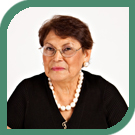 Teresa Arce was born and raised in Lima, Peru. She came to America in 2006 to start a new life and be closer to her children and grandchildren. Little did she know her life was about to change even more drastically than she could have ever imagined. On December 30, 2008, Teresa was visiting her son in Savannah, Georgia, when she received the devastating news from her doctor … she had Stage IV ovarian cancer. She was immediately rushed to the hospital where she underwent an emergency partial hysterectomy. Despite the surgery, her prognosis remained bleak. Teresa’s doctors estimated she had six months to live without chemotherapy, and one year with treatment.
Teresa Arce was born and raised in Lima, Peru. She came to America in 2006 to start a new life and be closer to her children and grandchildren. Little did she know her life was about to change even more drastically than she could have ever imagined. On December 30, 2008, Teresa was visiting her son in Savannah, Georgia, when she received the devastating news from her doctor … she had Stage IV ovarian cancer. She was immediately rushed to the hospital where she underwent an emergency partial hysterectomy. Despite the surgery, her prognosis remained bleak. Teresa’s doctors estimated she had six months to live without chemotherapy, and one year with treatment.
Teresa, however, had other plans. It’s been 19 months since her diagnosis, and she is still fighting her battle with cancer and beating the odds every day. Her journey has been a difficult one, involving hair loss, pain, and two more surgeries. After making several trips back and forth to Savannah for treatment, she is presently receiving care in Huntsville.
Although Teresa’s cancer remains aggressive, so is her spirit. Her strength to fight is stronger than ever. She keeps herself busy as much as possible, and when she is able, she studies English, enjoys knitting, and faithfully attends Bible study and church. Teresa’s children – Jorge and Frescia in the U.S., and Juan Jose, Enrique, and Katherine in Peru – remain steadfastly supportive, helping her conquer this terrible disease.
For her garden, Teresa chose a brilliant swath of red and white snapdragons in the shape of the Peruvian flag to represent her heritage. In the center is a large teal pot filled with thyme, signifying her courage, and rosemary for remembrance. Alliums, tulips, mums, and hyacinths also add fragrance and color to Teresa’s garden.
Teresa’s words of advice to others facing a similar challenge are simple, yet powerful. “Never lose your faith in God. He is always with you. Try to learn and grow from every experience in life, even the difficult ones.”
 When Ken Kavanaugh was first diagnosed with prostate cancer in May 2008, he was no stranger to the disease. He had already undergone multiple biopsies spanning a six-year period, and had even helped his wife of more than 40 years, Pat, battle breast cancer after receiving her diagnosis a few years earlier, as well as his father who had been diagnosed with lung cancer.
When Ken Kavanaugh was first diagnosed with prostate cancer in May 2008, he was no stranger to the disease. He had already undergone multiple biopsies spanning a six-year period, and had even helped his wife of more than 40 years, Pat, battle breast cancer after receiving her diagnosis a few years earlier, as well as his father who had been diagnosed with lung cancer.
To fight his cancer, Ken elected to receive radiation treatments five days a week for eight and a half weeks. Not one to back down, Ken worked throughout his therapy, scheduling treatments for early in the morning so he could minimize his time away from work. While he maintained a positive attitude throughout his experience, Ken acknowledges he faced challenges. “My emotions were all over the place during the radiation treatments,” said Ken. “I just wasn’t as patient as I normally am, and had to deal with some anger issues.”
Always by his side, Pat, the couple’s two daughters, Julie and Rebecca, and grandson Aaron were loving sources of inspiration for Ken during his cancer journey. “Pat recognized what was going on and did little things to support me,” said Ken. “I would come downstairs in the morning and sometimes there would be a card, just to cheer me up. She would let me ramble about how I felt, and would just listen.” Today, both Ken and Pat’s cancers are in remission.
Ever the devoted husband, Ken chose to adorn his garden with pinkish matrix primrose pansies in honor of Pat, as well as other breast cancer survivors. He also selected matrix light blue and white pansies to decorate his garden, which he hopes will inspire those who visit it to persevere in the face of adversity. “There’s so much negativity in the world,” explained Ken. “We all need to have more hope – more hope for the future, and more hope for ourselves.”
 Terry Lewis is known for her positive outlook on life. This character trait proved even more invaluable to her this past year, as she began her battle against breast cancer.
Terry Lewis is known for her positive outlook on life. This character trait proved even more invaluable to her this past year, as she began her battle against breast cancer.
In November 2009, Terry went in for a routine mammogram. The radiologist felt like something wasn’t right, so ordered a follow-up needle biopsy. The results were atypical – a shock to everyone, including Terry. A subsequent lumpectomy in January 2010 confirmed the worst – Terry had breast cancer. After consulting with her family and doctors, Terry decided to undergo a bilateral mastectomy in early February. During surgery, her doctors found a malignancy in one of her lymph nodes, which put her at Stage IIA, requiring chemotherapy treatments to ensure all cancer was eradicated from her body.
Terry’s chemo treatments began the end of March 2010, and continued for 18 weeks. The side effects weren’t pleasant – fatigue, weakness, and loss of hair, fingernails, and taste – but still Terry’s outlook remained optimistic. “A positive attitude makes all the difference,” says Terry. “I never thought of myself as a victim. It’s easier said than done, but being negative doesn’t make anything better.”
Herb, Terry’s husband, is always by her side, and provides constant inspiration and support. They both love to travel, and even managed to enjoy a cruise on the Baltic Sea only two days after her last chemo treatment. Terry also credits her two sons – Brian, with wife, Leigh, and Barry – plus her large support group of friends and family (especially her church family) for really reaching out to her during this time. Her life was deeply touched by people through her CaringBridge website, which was a great source of communication and encouragement.
For her garden, Terry chose a blaze of blue pansies symbolizing her own “sea of tranquility” like a garden represents. Intermixed with the pansies are pink tulips, emphasizing the fight against breast cancer. All are framed by beautiful white snapdragons.
Terry has recently undergone reconstruction surgery, and is doing well. When asked what advice she’d like to give others going through a similar situation, she confidently states, “Always look for the positive, knowing you can confront this ‘bump in the road’ and move beyond it.”
 On Mother’s Day 2007, a day usually filled with happiness and celebration, Maria Jimmison found a lump in her right breast. The life of this young, 29-year-old mother of three beautiful children – Danielle, Devin, and Dallas – was about to radically change. She immediately went to the doctor, who conducted a series of scans and tests that ultimately concluded she had Stage 2 metastatic breast cancer. Because her cancer was growing rapidly, her doctors opted to have her start chemotherapy and radiation treatments right away. Her treatments began July 4, 2007, and lasted nine months. The side effects during Maria’s chemo and radiation treatments were brutal; she couldn’t eat or sleep and lost her hair, fingernails, and toenails. Once her tumor was deemed cancer-free and had shrunk significantly in size, they removed it through surgery. Maria has now been in remission since 2008 – and faithfully takes her daily medications and sees her oncologist twice a year.
On Mother’s Day 2007, a day usually filled with happiness and celebration, Maria Jimmison found a lump in her right breast. The life of this young, 29-year-old mother of three beautiful children – Danielle, Devin, and Dallas – was about to radically change. She immediately went to the doctor, who conducted a series of scans and tests that ultimately concluded she had Stage 2 metastatic breast cancer. Because her cancer was growing rapidly, her doctors opted to have her start chemotherapy and radiation treatments right away. Her treatments began July 4, 2007, and lasted nine months. The side effects during Maria’s chemo and radiation treatments were brutal; she couldn’t eat or sleep and lost her hair, fingernails, and toenails. Once her tumor was deemed cancer-free and had shrunk significantly in size, they removed it through surgery. Maria has now been in remission since 2008 – and faithfully takes her daily medications and sees her oncologist twice a year.
For Maria, her biggest struggle during her trial with cancer was seeing her children have to experience cancer and its ill effects. The radical lifestyle change was also difficult – from going to school, working, and being an active mom to feeling sick and not being able to do much. Her mom, Jackie, was and remains her source of strength. Upon Maria’s diagnosis, Jackie stated she wished she could take this cancer from her, and carry that burden herself. To Maria, that just reiterated how strong a mother’s love really is. Maria also drew closer to God during this time. “My mom was there for me physically, but God really helped me from a spiritual standpoint. I never asked Him why, I just trusted Him to see me through this.” Maria also thanks the rest of her family, friends, and prayer partners for their unfailing support.
For her garden, Maria chose pink and white vinca, which to her symbolize faith, courage, and peace. They are planted in the shape of the breast cancer ribbon – with pink violets in the center and white outlining it.
Maria stresses that cancer is not the end; it’s the beginning of a new life. “It is so important to rely on God when going through something like this. He’ll give you the faith, hope, and courage you need to be victorious over any obstacle that comes along to destroy you.”
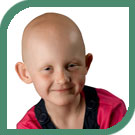 Like most little girls her age, six-year-old Sydney Newton loves playing with baby dolls and her dog, Alice. However, unlike most other little girls, Sydney was diagnosed last year with an inoperable rhabdomyosarcoma behind her left eye. After receiving the diagnosis, Sydney’s devoted paren ts, Cynthia and Jamie, immediately jumped into action, entrusting Sydney to the care of the Children’s Hospital of Alabama for radiation and chemotherapy treatments.
Like most little girls her age, six-year-old Sydney Newton loves playing with baby dolls and her dog, Alice. However, unlike most other little girls, Sydney was diagnosed last year with an inoperable rhabdomyosarcoma behind her left eye. After receiving the diagnosis, Sydney’s devoted paren ts, Cynthia and Jamie, immediately jumped into action, entrusting Sydney to the care of the Children’s Hospital of Alabama for radiation and chemotherapy treatments.
While fighting her cancer, which primarily affects children, Sydney has demonstrated that she is a very brave little girl. She enjoys showing off her Beads of Courage, colorful beads representing strength and courage for undergoing cancer treatments. “They’re like medals of honor,” explained Cynthia.
Sydney’s biggest challenge in her fight against cancer has been spending time in the hospital, away from her friends, family, and older brother, Dawson. Yet, her experience has made Sydney even more empathetic toward others, especially children. “She definitely thinks about others’ feelings more now,” said Cynthia.
Sydney’s garden gives one a glimpse into her sweet and playful heart. She chose to decorate her garden with bright pink and red flowers to represent the love she feels, as well as lantana and salvia to attract butterflies and hummingbirds. Sydney, who enjoys helping her mother take care of the family’s flower garden at home, also selected an ornament of a “lucky ladybug” to adorn her vivid garden – a symbol that has carried Sydney through her journey with cancer.
The Newtons, who have relied on their faith in God, as well as their tight-knit family to help them through Sydney’s cancer treatment, believe the diagnosis is one of the best things that has ever happened to their family. “We only thought we knew what was important before,” explained Cynthia. “We just hope people are able to see our faith, our love for one another, and our desire to do more for others just as others have done for us.”
 Teresa Smith defines her cancer story in two words … a journey. It began in July 2009, when she found out what had been previously diagnosed as a cyst was actually Stage 2 breast cancer. Something seemingly minor soon became life-changing.
Teresa Smith defines her cancer story in two words … a journey. It began in July 2009, when she found out what had been previously diagnosed as a cyst was actually Stage 2 breast cancer. Something seemingly minor soon became life-changing.
Upon consulting with the superb medica l staff at Atlanta Piedmont Hospital and conducting her own research, Teresa began her battle against cancer with chemotherapy, followed by surgery. Her doctors felt that was the best “plan of attack” given the aggressiveness of the cancer. She underwent two rounds of chemo, 16 total treatments, over 20 weeks. The first several treatments were the most severe, with many side effects. But Teresa steadfastly kept her eyes on the end goal – to be cancer-free and healthy. In January 2010, Teresa had a bilateral mastectomy to remove all the cancer, and is scheduled to have her final reconstructive surgery sometime in the summer of 2010.
Teresa approached her cancer journey in much the same way she approaches her work – with a clear plan with set milestones. This approach also helped her keep her life as normal as possible. “Cancer is not my life,” voiced Teresa. “It is something that happened in my life, but I didn’t want it to become my only focus. There’s no real way to speed up those 20 weeks of treatment, so keeping my focus on work and other things was so helpful to me – a good distraction.”
Teresa is blessed with a wonderful support network, both personally and professionally. She credits her family, friends, management, colleagues, and the Piedmont Hospital medical staff for helping her through this journey. Wayne was and remains always by her side, never missing an appointment. Others who had fought and won their own battles with cancer also encouraged and inspired her.
For her garden, Teresa chose a colorful and fragrant mixture of pink begonias and rosemary. She stresses the importance of listening to your own body. “You know it better than anyone does, and when something doesn’t seem or feel right, go get it checked out. It’s always better to remove all doubt.”
 Amy Scoggins has always prided herself on her optimistic outlook on life, and when she was first diagnosed with ductal carcinoma in situ (DCIS) breast cancer in April 2006, she tackled the disease with the same positive attitude. Upon her diagnosis with DCIS, the most common type of non-invas ive breast cancer, Amy’s doctors recommended a double mastectomy, which she underwent in May 2006. After living without cancer for nearly three years to the day, Amy was re-diagnosed in 2009, and soon began a multitude of chemotherapy and radiation treatments.
Amy Scoggins has always prided herself on her optimistic outlook on life, and when she was first diagnosed with ductal carcinoma in situ (DCIS) breast cancer in April 2006, she tackled the disease with the same positive attitude. Upon her diagnosis with DCIS, the most common type of non-invas ive breast cancer, Amy’s doctors recommended a double mastectomy, which she underwent in May 2006. After living without cancer for nearly three years to the day, Amy was re-diagnosed in 2009, and soon began a multitude of chemotherapy and radiation treatments.
For Amy, the three surgeries she has endured since her diagnosis have been her biggest challenge in her fight against cancer. However, her upbeat attitude, coupled with the love and support of her husband Jimmy and three sons Brantley, Will, and Colton helped carry Amy through her struggle. “My family is what has kept me going,” explained Amy. “I feel very, very lucky.” She also relied on her close friends, whose love and encouragement was paramount in helping her cope with the disease.
Amy’s garden is a true representation of her attitude: bright and cheerful. She chose to adorn her garden with pink and white pansies, pink tulips, and a pink rose bush, as well as rosemary to symbolize remembrance. It is Amy’s hope that the “power of pink” will inspire women to trust their bodies and also to schedule regular mammograms.
Amy feels there is a reason why she was re-diagnosed, and hopes to inspire others to remain strong and optimistic through her touching story. “Why not live each day and just be positive?” asks Amy. “We can all sit and feel sorry for ourselves, or we can go out there do good things.” Amy, who wholeheartedly believes a positive attitude is the key to a happy life, continues to live that sentiment every day. ”
 Upon waking every morning, Annalie Maynard does something she, a 62-year-old grandmother, never did before she was diagnosed with a glioblastoma brain tumor in March 2008 – she takes some time to sit quietly, pray, and reflect on her life. Annalie had experienced persistent headaches before she consulted her doctor, who then recommended a CT scan indicating the glioblastoma was present in the back center portion of her brain. In April, 2008, Annalie underwent surgery, which successfully removed much of the tumor, and two months later, began radiation therapy. Throughout her journey with cancer, Annalie has found solace in her faith in God and has re-evaluated how she spends her days.
Upon waking every morning, Annalie Maynard does something she, a 62-year-old grandmother, never did before she was diagnosed with a glioblastoma brain tumor in March 2008 – she takes some time to sit quietly, pray, and reflect on her life. Annalie had experienced persistent headaches before she consulted her doctor, who then recommended a CT scan indicating the glioblastoma was present in the back center portion of her brain. In April, 2008, Annalie underwent surgery, which successfully removed much of the tumor, and two months later, began radiation therapy. Throughout her journey with cancer, Annalie has found solace in her faith in God and has re-evaluated how she spends her days.
Annalie currently takes maintenance medication to ensure the cancer does not grow, and also regularly meets with a brain cancer support group. She continues to receive good reports from her doctors, a blessing she attributes to her trust in God and also the flood of encouragement and love she receives from her friends and family – husband Gordon, sons Todd and Brant, their very supportive wives, Brandy and Elesha and grandchildren Dakota, Gavin, and Sarah Grace.
Annalie, very active in her church and community, maintains that the interruption to her routine has been her biggest struggle in her fight against cancer. While she looks forward to regaining her energy, Annalie chooses not to dwell on the negative aspects of her experience. “When I get melancholy, anxious or frustrated, I stop and count my blessings and that puts things in perspective.”
Annalie has decorated her garden with bright yellow and purple pansies, which she has always enjoyed for their bursts of color when everything else is lifeless. Annalie’s garden also features several types of herbs as well as a couple of statuaries that represent her hobbies, reading and bird watching.
A retired librarian and schoolteacher, Annalie is accustomed to teaching others. She hopes her cancer journey will help others see that God is faithful, especially during our hour of tribulation.
 When Linda Green first noticed a lump in her breast at age 53, she was in disbelief. It was May 2004, not even one full year since her most recent annual mammogram. After consulting her doctor, Linda was diagnosed with Stage 3 breast cancer.
When Linda Green first noticed a lump in her breast at age 53, she was in disbelief. It was May 2004, not even one full year since her most recent annual mammogram. After consulting her doctor, Linda was diagnosed with Stage 3 breast cancer.
“I was completely shocked because I had been diligent about annual check-ups, and also because the lump was large enough for the doctor to recommend a mastectomy and chemotherapy,” Linda explained. In June 2004, she underwent a bilateral mastectomy, and in August, began a five-month chemotherapy regimen. For Linda, her battle with breast cancer was surreal. “It was almost like an out-of-body experience. I could hear what the doctors were saying, but emotionally I needed to keep it at a distance in order to deal with it and make good decisions.”
Linda attributes the support from her family, friends, community, and other cancer survivors to helping her cope with the disease. Her husband Randy and son Matt played a significant role in easing Linda’s anxiety about the cancer possibly returning. “My family was with me every step of the way, and has really helped me move forward.” She is also grateful for the high quality of medical care she received from Dr. Philip McGee at Clearview Cancer Institute and Dr. Charles Warren at the Clinic for Women.
Linda’s garden represents paying it forward by helping others, just as her community of cancer survivors helped her. It also represents her hope that all who experience cancer will feel the love, caring, and support that she felt surrounded her. Linda’s garden includes pansies for friendship, Invincibelle Spirit hydrangea for breast cancer patients, rosemary for remembrance, and bamboo and thyme representing the courage and strength she derived from others.
Linda, cancer-free for five years, would like her experience with breast cancer to convey a message of hope. “We can all help each other through these difficult times. My journey with cancer has taught me that everyone has to have hope.”
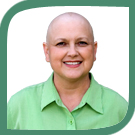 In December 2008, Nancy Wallis was diagnosed with Stage 3 ovarian cancer, known as the “silent killer” of women because it is often difficult to detect. Her story, however, really begins two years prior, when she underwent a partial hysterectomy given her family history of breast and uter ine cancer. During a routine doctor visit a year following her surgery, Nancy mentioned having unusual bloating in her abdominal region. After a battery of tests, Nancy’s doctors determined she had ovarian cancer, and called for immediate surgery. During the surgery, physicians found the cancer to be very pervasive – two cancerous tumors in her stomach, a large platter-size mass across the top of her stomach, and affected areas within her colon. The operation was lengthy and required considerable reconstruction.
In December 2008, Nancy Wallis was diagnosed with Stage 3 ovarian cancer, known as the “silent killer” of women because it is often difficult to detect. Her story, however, really begins two years prior, when she underwent a partial hysterectomy given her family history of breast and uter ine cancer. During a routine doctor visit a year following her surgery, Nancy mentioned having unusual bloating in her abdominal region. After a battery of tests, Nancy’s doctors determined she had ovarian cancer, and called for immediate surgery. During the surgery, physicians found the cancer to be very pervasive – two cancerous tumors in her stomach, a large platter-size mass across the top of her stomach, and affected areas within her colon. The operation was lengthy and required considerable reconstruction.
Nancy is currently undergoing chemotherapy treatments that specifically target the formerly cancerous regions of her body. Her biggest challenge in her journey through cancer is overcoming fatigue. She is diligently working to build back her energy and strength and return to her day-to-day life as best she can. When asked what helps her during those especially demanding days, Nancy commented, “I am continuously inspired by the enormous amount of love and support from my family, friends, and even complete strangers. It is just all so touching.”
For her garden, Nancy wanted to help raise awareness of ovarian cancer. Just as breast cancer is represented by the color pink, ovarian cancer’s color is teal. Nancy’s garden features a teal pot, filled with white flowers signifying her resilient faith and the purity of God. Surrounding the pot are colorful flowers that celebrate life, as that, after all, is her ultimate goal.
Nancy hopes other women can learn from her experience. “Ovarian cancer is so quick and can progress so fast. Pay close attention to your body and any unusual changes.” Nancy especially wanted to stress four key symptoms of ovarian cancer: bloating, pelvic or abdominal pain, difficulty eating or feeling full quickly, and abnormal urinary symptoms. “My prevailing hope is that someone can catch this much sooner than I did.”
 Wayne Hamlin’s cancer story is a recent one. In September 2008, during a routine check-up, doctors discovered Wayne had prostate cancer. His Prostate-Specific Antigen (PSA) levels had been consistently high for about a year, and biopsies further confirmed his diagnosis. Wayne’s next step was to determine how best to treat his cancer. Prostate cancer has many treatment options – radiation, seed implants, hormone treatments, and surgery – but this plethora of choices makes the path of treatment a very personal decision for each individual. After conducting considerable research and consulting with oncologists and urologists both in Georgia and New York City, Wayne chose to undergo a radical prostatectomy in late March 2009.
Wayne Hamlin’s cancer story is a recent one. In September 2008, during a routine check-up, doctors discovered Wayne had prostate cancer. His Prostate-Specific Antigen (PSA) levels had been consistently high for about a year, and biopsies further confirmed his diagnosis. Wayne’s next step was to determine how best to treat his cancer. Prostate cancer has many treatment options – radiation, seed implants, hormone treatments, and surgery – but this plethora of choices makes the path of treatment a very personal decision for each individual. After conducting considerable research and consulting with oncologists and urologists both in Georgia and New York City, Wayne chose to undergo a radical prostatectomy in late March 2009.
Wayne’s surgery was a success, and was much easier on him than originally expected. When asked about his cancer journey, Wayne replied, “You always think, this isn’t something that’s going to happen to me. I’ve just dealt with it on a factual basis, so it hasn’t really hit me on an emotional level yet.” He feels blessed that doctors detected it early and could take care of it before it had the opportunity to spread any further. Early tests indicate that the cancer has been eradicated.
Wayne’s family has been by his side the entire time. He credits his wife Jan and his three children, Greg, Vicki, and Chris, as his inspiration and support network. Coworkers and friends who have had family members who battled prostate cancer provided insight and support as well. His mother also gives him hope for his future, as she’s overcome both colon and breast cancer.
Wayne’s garden is filled with yellow and multi-colored lantana and deep red coleus. With it, he honors his family, especially his father, whom he lost to lung cancer. He hopes other men facing prostate cancer will do exactly as he did. “Learn all you can, and don’t rush into a decision or you’ll start second-guessing yourself. Talk to other men who have lived through it, as they can tell you what to expect down the road.” Wayne feels that if his story can open someone’s eyes and help men be more proactive with their own health, something good has already come out of his experience.
 In the words of Garth Keesler, having prostate cancer is truly “life-altering.” During a routine exam in March 2008, Garth’s Prostate-Specific Antigen (PSA) test levels rated higher than normal. Given his family history of prostate cancer, Garth was proactive and consulted a specialist for further tests. Over a period of eight months, he underwent several more examinations and biopsies. In December 2008, it was determined he did indeed have prostate cancer, fortunately in its early stages.
In the words of Garth Keesler, having prostate cancer is truly “life-altering.” During a routine exam in March 2008, Garth’s Prostate-Specific Antigen (PSA) test levels rated higher than normal. Given his family history of prostate cancer, Garth was proactive and consulted a specialist for further tests. Over a period of eight months, he underwent several more examinations and biopsies. In December 2008, it was determined he did indeed have prostate cancer, fortunately in its early stages.
After conducting extensive research on the Web and chatting online with other men with the same diagnosis, Garth decided to undergo a radical prostatectomy in January 2009. He made a speedy recovery after his surgery, even returning to work after only three weeks. Tests following the surgery show his PSA level as undetectable, which is as good as it gets for prostate cancer patients. When talking about his recovery, Garth was frank. “The healing process takes a very long time. You don’t really know what life will be like until 18 months after surgery.” He credits his wife, Carol, of 41 years as his greatest inspiration during this challenge, especially since she conquered her own battle with lung cancer. Garth commented, “I had somebody there in my corner who had been through something even worse, so we could really relate and support each other.”
Garth’s garden is an extension of his personality. His winning smile and positive attitude is reflected in the total disarray of multi-colored petunias and salvia, which Garth’s wife says is quite fitting for him. It is meant to raise the spirits of all who visit the garden.
When asked what advice he’d like to pass on to other men, Garth stressed the importance of early detection. “Prostate cancer is the one of the deadliest forms of cancer for men in the United States. Knowing is always better than not knowing. If you are between 50 and 70 years old, you need to get yearly screenings. Then you have both choices and chances.”
 In May 2002, Doris Riccelli looked forward to celebrating her 40th birthday, unaware she would receive a startling diagnosis. During a breast self-exam, Doris found a lump in her left breast and immediately sought medical attention. Extensive tests and a lumpectomy confirmed stage 1 breast cancer. In August, she began receiving chemotherapy through a surgically-inserted port in her chest. In October, the port became infected and had to be removed. After much prayer and against her doctors’ recommendations, Doris decided against a new port. In December, she found a lump in her right breast where the port had been. A second lumpectomy again proved positive for stage 1 breast cancer. Doctors recommended a more aggressive regime of chemotherapy, but Doris decided against it. She then received 34 radiation treatments.
In May 2002, Doris Riccelli looked forward to celebrating her 40th birthday, unaware she would receive a startling diagnosis. During a breast self-exam, Doris found a lump in her left breast and immediately sought medical attention. Extensive tests and a lumpectomy confirmed stage 1 breast cancer. In August, she began receiving chemotherapy through a surgically-inserted port in her chest. In October, the port became infected and had to be removed. After much prayer and against her doctors’ recommendations, Doris decided against a new port. In December, she found a lump in her right breast where the port had been. A second lumpectomy again proved positive for stage 1 breast cancer. Doctors recommended a more aggressive regime of chemotherapy, but Doris decided against it. She then received 34 radiation treatments.
Doris took cancer preventative drugs, but after suffering for four years from unbearable side-effects including loss of energy, arthritis and pain, she stopped taking the drugs in November 2006. While Doris still struggles with the after-effects of her treatments, she trusts God with her life and has been cancer-free for six years.
Doris’s garden symbolizes people she loves. In the center is a ribbon of pink sand, outlined in red to signify her husband, who always inspires her. The white flowers represent Doris’s faith. Attached to the ribbon are two flower pots; one signifying the courageous spirit of her beloved mother and the other her dearest friend, Linda, both who lost their lives to cancer. A third pot honors her daughter, Britney, and symbolizes hope. Two areas represent beaches where Doris and her loved ones shared precious moments together. The peonies are in memory of her husband’s mother, and the tulips signify new life.
Doris’s desire is for all to have a personal relationship with God, show care for those experiencing challenges, and be vigilant about regular check-ups for early detection. Doris has experienced amazing blessings during her cancer journey and believes God has a plan for each person’s life.
 Just before Hunter Aiton turned six, he was diagnosed with non-Hodgkins lymphoma, a rare cancer that affects just one in a million children worldwide each year. The cancer was detected early under his right arm; however, within two weeks it had spread to both kidneys, his left thigh, and areas next to his pancreas and liver.
Just before Hunter Aiton turned six, he was diagnosed with non-Hodgkins lymphoma, a rare cancer that affects just one in a million children worldwide each year. The cancer was detected early under his right arm; however, within two weeks it had spread to both kidneys, his left thigh, and areas next to his pancreas and liver.
Throughout his fight against cancer, there were difficult periods – including losing his hair, a severely restricted diet, and not being able to play outside with his twin sister, Hailey. However, Hunter bravely underwent numerous chemotherapy treatments and never doubted he would be healthy again.
Today, Hunter is a vivacious seven-year-old who is using his own experience to help others battling cancer. Last summer, he helped raise money for St. Jude’s Children’s Research Hospital in Memphis, Tennessee, where he received treatments that helped save his life. “I know there are kids who have cancer and are scared,” Hunter says. “I want to help them live and let them know that I’m alive today.” After more than 100 visits in 14 months to both hospitals, he is in remission.
Hunter enjoys being back at Mt. Carmel Elementary School. His parents, Jean and Lisa Aiton, believe Hunter’s battle brought the family closer to each other, their friends, and coworkers, and appreciate the opportunity to raise community awareness for cancer. They say they have learned more from Hunter’s courage than they have in their entire lives; the way he approached his treatments day to day with dignity and pure faith in God was inspirational. Hunter says that those suffering from cancer should let their faith be their guide. “I believe heavily that Jesus is taking care of me and that with God in your heart nothing is impossible.”
Hunter says life is like a beautiful flower. The vision for his garden is one of hope and courage, one that speaks of faith and strength.
 In March 2007, life as Vickie Sauer knew it changed forever. Always vigilant with her yearly mammograms, her appointment that month showed an uncharacteristic mass. Tests were run, and soon after Vickie received the news – she had stage 1 breast cancer. Her doctors gave her several options , and Vickie conducted thorough research on each one and spoke with other women who were battling or had overcome breast cancer. Armed with information, Vickie decided to have a lumpectomy and lymph node biopsy in May 2007.
In March 2007, life as Vickie Sauer knew it changed forever. Always vigilant with her yearly mammograms, her appointment that month showed an uncharacteristic mass. Tests were run, and soon after Vickie received the news – she had stage 1 breast cancer. Her doctors gave her several options , and Vickie conducted thorough research on each one and spoke with other women who were battling or had overcome breast cancer. Armed with information, Vickie decided to have a lumpectomy and lymph node biopsy in May 2007.
After her surgery, doctors ran tests to see if chemotherapy was needed. Thankfully, it was not necessary as the cancer had not spread outside of her breast, but she did undergo seven weeks of daily radiation treatments. As follow-up to her treatment, Vickie has to have mammograms every six months and hormone treatments for five years. Right now, all test results show that the cancer is no longer in her body. She will be declared cancer-free after five years. One year down, four to go!
Vickie’s family – husband Don, son Matthew, 21, and daughter Niki, 20 – attest to Vickie’s great strength during her ordeal. Vickie credits her family and friends as her inspiration during her diagnosis and treatment, as well as other women she met who have actually walked in her shoes. They gave her hope that she, too, would overcome this disease. Also important, Vickie stresses, is coming to terms with having cancer. It was a difficult realization, but a crucial step toward healing.
For her garden, Vickie chose a variety of hot pink pansies and tulips to represent the celebration of life. The flowers are planted in the shape of the breast cancer ribbon, serving as a reminder to all women of the importance of yearly mammograms. Rosemary, cabbages, and kale complement the flowers.
 Having just returned from the beach, Glynnis Cory gave no serious thought to her annual gynecological exam. That soon changed when her doctor discovered an unusual mass. A week later, Glynnis received an unexpected blow; she had adenocarcinoma – a less common type of cervical cancer. Doctors felt it was contained and in the early stage, but required a radical hysterectomy to be completely sure. During her surgery, doctors found a cluster of cancerous lymph nodes as well, requiring Glynnis to bravely undergo six weeks of daily radiation and chemotherapy treatments.
Having just returned from the beach, Glynnis Cory gave no serious thought to her annual gynecological exam. That soon changed when her doctor discovered an unusual mass. A week later, Glynnis received an unexpected blow; she had adenocarcinoma – a less common type of cervical cancer. Doctors felt it was contained and in the early stage, but required a radical hysterectomy to be completely sure. During her surgery, doctors found a cluster of cancerous lymph nodes as well, requiring Glynnis to bravely undergo six weeks of daily radiation and chemotherapy treatments.
Now several months after completing all treatments, Glynnis’ doctors are very pleased with her current test results, especially the malignancy levels within her body. For the next several years, she’ll have regular tests and scans to ensure the cancer has not returned. She looks forward to the five-year mark, when she can finally declare herself cancer-free.
Truly a people person, Glynnis credits the overwhelming love and support of her family and friends as what helped her through the tough times. All the calls of support, words of love, prayers, notes, meals, and more changed her life forever. She vows to show people each day as much love, care, compassion, and generosity of spirit they so openly demonstrated to her.
Glynnis chose an assortment of white flowers for her garden – pentas, petunias, salvia, and verbena – to represent a new, fresh start in her life. She hopes her experience will encourage others to take ownership of their health. She stresses the importance of yearly examinations, wholesome food, exercise, and plenty of sleep as part of a healthy lifestyle. Glynnis’ best advice? “Life is short. You need to love your loved ones. Don’t waste any time expressing or showing it, because none of us is promised another day and life is just too precious.”
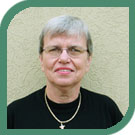 Nancy Hampton was always faithful about having yearly mammograms. In June 2007, her routine digital mammogram suddenly changed into something far from routine. It revealed a mass in her left breast, and the possibility of one in her right. After several biopsies and x-rays, Nancy’s doctor diagnosed her with early stage breast cancer. Rather than go through radiation or chemotherapy, Nancy opted to have a double mastectomy. Almost a year later, Nancy is doing well, and showing no signs of cancer.
Nancy Hampton was always faithful about having yearly mammograms. In June 2007, her routine digital mammogram suddenly changed into something far from routine. It revealed a mass in her left breast, and the possibility of one in her right. After several biopsies and x-rays, Nancy’s doctor diagnosed her with early stage breast cancer. Rather than go through radiation or chemotherapy, Nancy opted to have a double mastectomy. Almost a year later, Nancy is doing well, and showing no signs of cancer.
Nancy’s ordeal with cancer not only changed her physically, it transformed her total outlook on life. She wants to do things she’s never done before. She wants to be sure her friends and family know how much they mean to her. Nancy’s faith in God gave her strength during her dark days. She feels He must have something very special planned for her life, and she looks forward to finding out what it is. To the people that know Nancy, however, that purpose seems obvious. Her friendly smile, superb work ethic, and continual willingness to help those around her prove she makes a positive difference in people’s lives every day.
For her garden, Nancy chose a mixture of plants and flowers, which includes purple flowering plants, as purple is her favorite color; little roses, in memory of her mother; and a variety of mints, because she loves the smell. Sprinkled throughout will be statues of black and tan dachshunds, representing her beloved dogs.
Yearly mammograms are Nancy’s mantra to all women. She encourages women to be proactive and take charge of their health. For someone facing cancer, she stresses the importance of making decisions based on what is best for them. And, during those difficult times, sit down and make a list of things you’re grateful for. Nancy guarantees it’ll lift your spirits.
 Chris Russell views his battle with cancer as one involving his entire family. Chris was diagnosed with testicular cancer on Aug. 10, 2006, shortly after his 40th birthday. While he was the one receiving medical attention, Chris says it was more challenging for his family. His wife, Sharon Do viet, and his sons, Jackson and Nathan Russell, stood beside him during this difficult time.
Chris Russell views his battle with cancer as one involving his entire family. Chris was diagnosed with testicular cancer on Aug. 10, 2006, shortly after his 40th birthday. While he was the one receiving medical attention, Chris says it was more challenging for his family. His wife, Sharon Do viet, and his sons, Jackson and Nathan Russell, stood beside him during this difficult time.
Chris had surgery to remove the cancer mass, followed by radiation treatment. He was told there was only a three percent chance the cancer would return. However, it did return the following spring. Instead of his life returning to normal, Chris endured months of aggressive chemotherapy. Thanks to Dr. Philip McGee, Susan Nolen, Angie Ezell, and the team at the Clearview Cancer Institute in Huntsville, Chris is cancer-free today.
Remarkably, Chris views his battle as being far more positive than negative. He doesn’t associate his cancer with surgery, radiation, chemotherapy, or baldness. Instead, he recalls the overwhelming sense of love and support shown from everyone around him – family, neighbors, friends, and colleagues. He also drew inspiration from his mother, Phyllis, who died 14 years ago following a long battle with cancer.
Chris selected a centerpiece of bougainvilleas to represent his family with a theme of balance. The plants are resilient while at the same time representing the beauty in life. Red geraniums represent his mother. Bright petunias make up the rest of his garden and represent the network of support Chris received. He is pleased to share the same planting area as Meg Ingram, a family friend and previous Garden of Hope honoree, who died from cancer in 2008.
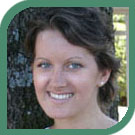 In August 2006, a severe headache sent Meg Ingram, now 21, to the hospital emergency room. Scans revealed a brain tumor, and two days later Meg was in surgery. Within two weeks, she began a long course of chemotherapy and radiation. Then last July, the appearance of a second primary tumor required a switch to more aggressive chemotherapy, which she is currently undergoing.
In August 2006, a severe headache sent Meg Ingram, now 21, to the hospital emergency room. Scans revealed a brain tumor, and two days later Meg was in surgery. Within two weeks, she began a long course of chemotherapy and radiation. Then last July, the appearance of a second primary tumor required a switch to more aggressive chemotherapy, which she is currently undergoing.
Despite her trials, Meg’s optimism and determination are immediately apparent. Strengthened by the love of her family and her faith, and inspired by her father’s positive attitude during his two battles with cancer, Meg wakes up each morning and chooses to enjoy her life to the fullest.
According to Meg’s mother, H.J., Meg has not allowed herself a single negative day, and barely a negative moment. Instead, she focuses on her many blessings. “I have cancer, but it doesn’t have me,” she announced early on.
Meg’s amazing attitude has enabled her to keep up with her nursing studies at the University of Alabama, and even with the cheerleading she loves. In fact, she cheered with her squad on the football field just three weeks after her surgery, and by the end of the season, she was stunting!
Meg’s garden expresses different aspects of herself, and stands as a colorful reminder of the joy with which she lives every day. She wants others to know that, like her, they can get through anything.
 In March 2007, Rhondalyn Acklin, 16, noticed an enlarged lymph node. Concerned about their daughter’s health, Rhondalyn’s parents made an appointment with the doctor. He recommended surgery, and before long, Rhondalyn had the node removed. Biopsy results revealed startling new s – Rhondalyn had Hodgkin’s disease, or cancer of the lymph nodes. The diagnosis was followed by 12 weeks of chemotherapy at St. Jude’s in Huntsville and every four weeks at its main facility in Memphis. Chemotherapy was followed by two weeks of radiation. As Rhondalyn lost clumps of hair, she didn’t get upset – she saw it as a sign the treatments were working and simply shaved her head. “It’s just hair – it will grow back,” she says.
In March 2007, Rhondalyn Acklin, 16, noticed an enlarged lymph node. Concerned about their daughter’s health, Rhondalyn’s parents made an appointment with the doctor. He recommended surgery, and before long, Rhondalyn had the node removed. Biopsy results revealed startling new s – Rhondalyn had Hodgkin’s disease, or cancer of the lymph nodes. The diagnosis was followed by 12 weeks of chemotherapy at St. Jude’s in Huntsville and every four weeks at its main facility in Memphis. Chemotherapy was followed by two weeks of radiation. As Rhondalyn lost clumps of hair, she didn’t get upset – she saw it as a sign the treatments were working and simply shaved her head. “It’s just hair – it will grow back,” she says.
A cheerful and fun-loving student at Oakwood Academy, Rhondalyn hasn’t let cancer keep her down. Although she struggled with having to miss weeks of school, she kept up with her studies and passed all her finals. She is grateful for her family, friends, teachers, and schoolmates, who supported her with prayers, visits, phone calls, and cards.
Now that she is back in school, Rhondalyn has returned to activities she loves. She is completing her requirements as a Certified Nurse’s Assistant, and has resumed her duties as secretary for both her class and her school. She also sings in the Oakwood Academy choir, is on the school Step team, and works at the skating rink! Rhondalyn is excited about her garden, and says she has always wanted to plant one. It stands as a reminder of the strength she found through her faith in God. She and her parents hope her experience will strengthen others’ faith as well.
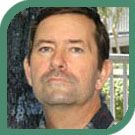 In March 2007, Rick Johnson began feeling an odd sensation in the back of his throat. He at first dismissed it as nothing serious, but after noticing some sort of mass on his tongue in the mirror, he quickly made an appointment with his doctor. Less than a month later, Rick and his family received an unexpected blow – he had tongue cancer – a very rare type, especially for non-smokers.
In March 2007, Rick Johnson began feeling an odd sensation in the back of his throat. He at first dismissed it as nothing serious, but after noticing some sort of mass on his tongue in the mirror, he quickly made an appointment with his doctor. Less than a month later, Rick and his family received an unexpected blow – he had tongue cancer – a very rare type, especially for non-smokers.
Because the mass on his tongue was growing rapidly, Rick’s doctors immediately had him undergo a combination of radiation and chemotherapy for seven weeks. The biggest challenge, however, was the location of the cancer and its resulting side effects. The mass proved quite troublesome, requiring Rick to have a feeding tube and even a tracheotomy prior to his cancer treatments.
Today, Rick is cancer-free, and is now focusing on rebuilding his strength and stamina. He jokingly advises others that if they ever get sick, make sure they’re married first. He credits his wife, Tiffany, as being his greatest strength and inspiration during this difficult time. Also standing firm by his side were his two sons, Parker, age nine, and Seth, age six.
For his garden, Rick chose a bright swath of yellow flowers, symbolizing the Lance Armstrong “Live Strong” bracelet his son Parker wore even before he received his diagnosis. Also featured in his garden is a single decorative tree in honor of his mother, Patricia Waldon, who he lost to cervical cancer. Rick hopes his experience will help others realize that cancer is not the death sentence it once was. You can be diagnosed, receive treatments, and come out at the end cancer-free. After all, he’s living proof.
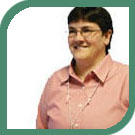 After finding a lump in her breast in November 2005, Laurie Harris was prepared to dismiss it as nothing serious until her friends encouraged her to see her doctor. After three months of tests and checks on the lump, a surgeon performed a lumpectomy to remove and biopsy the growth. In February 2006, Laurie’s doctor diagnosed her with Stage One breast cancer.
After finding a lump in her breast in November 2005, Laurie Harris was prepared to dismiss it as nothing serious until her friends encouraged her to see her doctor. After three months of tests and checks on the lump, a surgeon performed a lumpectomy to remove and biopsy the growth. In February 2006, Laurie’s doctor diagnosed her with Stage One breast cancer.
While the tumor was not large and was still in its early stages, it was already invasive. Upon hearing her diagnosis, Laurie’s thoughts turned to her mother, who showed unwavering support to her husband (Laurie’s father) as he fought, and ultimately lost his battle with, lung cancer. Laurie was determined to channel the strength and spirit her own father had shown during his fight against cancer.
For her treatment, Laurie courageously underwent a combination of chemotherapy, radiation, and hormone therapy. Her mother was her rock throughout the entire process, supporting her at doctor visits and spending time with her at home. Doctors were pleased with the results from her six-month checkup in February 2007, and Laurie will continue to go back for periodic checkups.
In designing her garden, Laurie selected pink verbena in the shape of a ribbon to honor all who have been touched by breast cancer. The rosemary represents memory and is a memorial to those who, like her father, have lost their battles with cancer. The thyme signifies courage and is in honor of all those currently fighting cancer. Laurie also planted sage as a tribute to cancer survivors. Sage represents long life – which she looks forward to sharing with her friends and family.
 Frank Langelaan knows the meaning of a close call. In 2006, he was diagnosed with kidney cancer and underwent surgery just four weeks later. Doctors were confident the procedure was a success, and one year later, Frank’s quarterly checkups have all indicated his doctors were correct. At this moment, he is cancer-free.
Frank Langelaan knows the meaning of a close call. In 2006, he was diagnosed with kidney cancer and underwent surgery just four weeks later. Doctors were confident the procedure was a success, and one year later, Frank’s quarterly checkups have all indicated his doctors were correct. At this moment, he is cancer-free.
Frank considers himself to be lucky, and has committed to living life to the fullest and not taking anything for granted. One year later, his biggest daily struggle is finding the time to do everything he wants to accomplish.
His garden is a rich palette of vibrant colors, a place to ignite energy for life and for facing challenging situations with peace of mind. Frank designed his garden to serve as an inspiration for visitors, helping to communicate that even in the darkest hours life is precious and should be enjoyed to the fullest.
Frank hopes his experience teaches others that emotions – including sadness and sorrow – generate energy, enabling us to go through valleys and cross mountains. He believes experiencing the full spectrum of feelings helps to make life an exhilarating roller coaster, which is better than cruising through life on a straight, flat road.
 As an infant, Julie Nunn was a bright-eyed, precocious little girl who thrived on being around her big brother and sister and playing with stuffed animals. At her regular nine-month wellness checkup, Julie’s doctor noticed her abdomen felt firm to the touch. Comprehensive testing confirmed the doctor’s suspicions – Julie was diagnosed with Hepatoblastoma, a rare, malignant cancer affecting children and infants.
As an infant, Julie Nunn was a bright-eyed, precocious little girl who thrived on being around her big brother and sister and playing with stuffed animals. At her regular nine-month wellness checkup, Julie’s doctor noticed her abdomen felt firm to the touch. Comprehensive testing confirmed the doctor’s suspicions – Julie was diagnosed with Hepatoblastoma, a rare, malignant cancer affecting children and infants.
In the months leading up to her surgery, Julie endured four chemotherapy treatments. She underwent a fifth round of chemotherapy after her surgery in November 2000. In February 2001, Julie’s doctor declared her cancer-free. At each annual exam since that diagnosis, her doctor has delivered the wonderful news that her remission continues.
Today, Julie is a vibrant, energetic seven-year-old who loves sports, reading, and playing with her friends. Her garden is a light-hearted place that is full of life, and a bit girly. Julie loves butterflies, and has included Lantana to attract them to her garden.
She hopes her experience teaches others that cancer can happen to anyone – even to a baby. Julie and her family believe that faith is the only thing you can count on when life takes a turn in an unforeseen direction. They also believe, and have proven, that when you surround yourself with positive people in a positive environment, great things can happen.
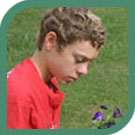 In the autumn of 2004, 11-year-old Jordan Grisham was like many other 5th graders – active, outgoing, and carefree. However, his easygoing lifestyle was hindered by headaches that got progressively worse and more frequent. By December, the pain could no longer be ignored. A preliminar y CT scan caused concern, so doctors scheduled an immediate MRI. The MRI showed a brain tumor nestled in the back of Jordan’s head. Less than a week later, just one week after the initial doctor visit and CT scan, Jordan underwent surgery, and the doctor removed the tumor – or so he thought. A post-operative MRI showed that a tiny bit of the tumor remained. The medical team did not want to put Jordan through another surgery until they could confirm what type of cancer they were up against.
In the autumn of 2004, 11-year-old Jordan Grisham was like many other 5th graders – active, outgoing, and carefree. However, his easygoing lifestyle was hindered by headaches that got progressively worse and more frequent. By December, the pain could no longer be ignored. A preliminar y CT scan caused concern, so doctors scheduled an immediate MRI. The MRI showed a brain tumor nestled in the back of Jordan’s head. Less than a week later, just one week after the initial doctor visit and CT scan, Jordan underwent surgery, and the doctor removed the tumor – or so he thought. A post-operative MRI showed that a tiny bit of the tumor remained. The medical team did not want to put Jordan through another surgery until they could confirm what type of cancer they were up against.
After an agonizing two-week wait for pathology results, Jordan received his diagnosis. He had medulloblastoma, a disease in which malignant cells form in the tissues of the brain. With this diagnosis, Jordan had to prepare for another surgery to remove the remainder of the tumor.
A post-operative MRI in January 2005 showed that doctors had successfully removed the remaining tumor. However, due to its malignancy, Jordan underwent an extensive series of radiation and chemotherapy treatments. Since the conclusion of his treatments, Jordan goes for regular MRIs. After each clean MRI, he regains a bit more of his pre-surgery lightheartedness.
From the start, Jordan had a positive attitude that carried him through his surgeries and treatments, inspiring those around him. He declared that the chemotherapy treatments would not make him sick – and, despite doctor’s warnings, he never got ill over the course of his treatments. On the first day of 6th grade, Jordan proudly wore his baseball cap to school, and he made straight As for the entire year.
Jordan believes in the power of a positive attitude and faith in God. For his garden, he selected vibrant, vivid colors to signify hope and make visitors happy.
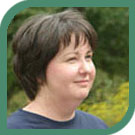 For years, Theresa Harding has been an advocate of regular mammograms. Twenty years ago, she watched her mother fight, and ultimately lose, her battle with breast cancer. As a result, Theresa has faithfully attended her own annual exams and encouraged those around her to be proactive and diligent about their own health.
For years, Theresa Harding has been an advocate of regular mammograms. Twenty years ago, she watched her mother fight, and ultimately lose, her battle with breast cancer. As a result, Theresa has faithfully attended her own annual exams and encouraged those around her to be proactive and diligent about their own health.
Despite her family history, education on the topic, and her regular screenings, Theresa was not prepared for the results of her mammogram in August 2006. The mammogram showed a tumor that, when biopsied, revealed early-stage breast cancer. Theresa underwent a lumpectomy and sentinel lymph node biopsy in September 2006. The biopsy resulted in what she calls “the best bad news possible” – the cancer had not spread. Because the tumor was detected at such an early stage, it was non- invasive, and chemotherapy was not required. For post-surgery treatment, Theresa attends regular radiation therapy sessions.
Theresa credits her husband and her medical teams with giving her strength and inspiration for her fight with breast cancer. Her husband and best friend of 26 years has been her number one supporter throughout her diagnosis and treatment. She credits her entire medical team with guiding her in the right direction, and her faith, family, and friends in helping her maintain a positive outlook.
While Theresa is thankful that her cancer was detected early, she is most afraid of the fact that her diagnosis means that her daughter and granddaughter are at an increased risk for breast cancer. She hopes that her garden will help educate and remind women that regular screenings and early detection are not only important, they give hope.
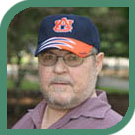 Jim Bennett has been battling prostate cancer since March 1993, and his success can be credited to the active role he takes in his treatment. In the spring of 1993, Jim’s wife of 27 years, Alma, suggested he have a Prostate Specific Antigen (PSA) blood count test during his annual check up. The level came back elevated, but for three years his biopsies were negative. As his PSA blood count continued to rise, Jim traveled to Johns Hopkins Hospital in 1996.
Jim Bennett has been battling prostate cancer since March 1993, and his success can be credited to the active role he takes in his treatment. In the spring of 1993, Jim’s wife of 27 years, Alma, suggested he have a Prostate Specific Antigen (PSA) blood count test during his annual check up. The level came back elevated, but for three years his biopsies were negative. As his PSA blood count continued to rise, Jim traveled to Johns Hopkins Hospital in 1996.
After rigorous testing, he learned that more than half of the biopsy cores taken showed signs of cancer. He was diagnosed with locally advanced prostate cancer, and in September 1996 underwent a radical prostatectomy. The next year, his cancer reoccurred and he was put on intermittent hormone therapy. This was followed in 1998 by radiation and seed implantation. The PSA was then held at bay until April 2001, and he was put back on hormone therapy. In September 2004, the PSA began rising again and estrogen was added to enhance treatment. The PSA count has since held steady for two years.
Throughout his battle with prostate cancer, Jim’s wife Alma has stood by his side. She heard about a conference in Nashville, Tennessee, in 1997 featuring Robert Urich as keynote speaker, and urged him to attend. Jim took Urich’s message to heart – you have to keep trying, be your own advocate, ask questions, and maintain hope – as he actively continues seeking information and new treatment options.
Jim has used his experience to help provide education to other men struggling with the disease by founding a Huntsville-based Man-to-Man, Prostate Cancer Education and Support Group. The group meets monthly and is sponsored by the American Cancer Society. He finds great satisfaction in knowing the group has provided many men with the answers they need, and is empowering them to take control of their treatment.
